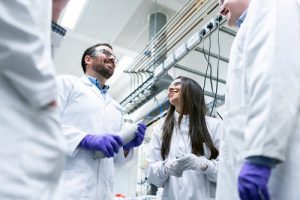
Montgomery College Biotechnology: Educating Research and Manufacturing Associates and Scientists for the BioHealth Capital Region
Montgomery College, Maryland’s largest and most diverse community college, provides the BioHealth Capital Region with dozens of qualified research and manufacturing associates each year. Graduates of our Biotechnology Program have a knowledge base in four key areas: Cell Culture and Aseptic Technique, Protein Biotechnology, Applied Immunology, and DNA/RNA Methods, plus knowledge of chemistry, microbiology, and genetics. Certificate programs in Biomanufacturing and Biotechnology are available for individuals who have already earned a 4-year or a master’s degree but want practical skills important to the local industry.
Accompanying hands-on laboratory instruction ensures that students are versed in current Good Manufacturing Practices (cGMP) and Good Laboratory Practices (GLP). Our facility includes dedicated laboratories for cell culture, protein and immunology, nucleic acid analysis, and a biomanufacturing suite. Frequent interaction with area biotechnology companies and with former students employed by these companies ensures the relevance of the curriculum.

Ample equipment ensures that each student receives hands-on instruction on industry-standard equipment used by their future employers. This training equipment includes Bioflo 310 Bioreactors, Wave Bioreactors, AKTA Avant and BioRad NGC FPLCs, Nanodrop spectrophotometers, Qubit fluorimeters, Agilent Bioanalyzer, TapeStation, and BioRad CFX96 qPCR. Hundreds of biotechnology students have been placed in full-time positions at area biotech companies. Many graduates continue their education to earn a baccalaureate or master’s degree while working. Several have or are in the process of earning a Ph.D.
“MC Biotech graduates are in demand. Biotech is an exciting and important industry, and it’s the perfect time to get into biotech and make a difference.”
–Lori Kelman, MBA, Ph.D., Professor, Montgomery College Biotechnology Program
MC Biotech meets the needs of working students. Our core courses are offered during the day and in the evening. Some courses are offered one day a week, with no course requiring more than a two-day commitment per week (plus study time). To make schedules more appealing, we have begun to offer lecture content remotely while still requiring in-person lab training. New this semester, we have unlinked lectures from the lab allowing the student to take a lecture on a topic at one time and the lab at a different time of day or even a different semester.
Our faculty, Dr. Collins Jones, Dr. Lori Kelman, and Prof. Padma Tangirala know that people learn best by “doing” and have developed a curriculum that allows practice and mastery of in-demand skills. Students learn about the regulatory environment using SOPs and batch records while following Good Documentation Practices. In addition to the hands-on wet lab training, our graduates are able to perform lab math, follow SOPs, and work well both independently and in groups; three skills that employers tell us are a must. Dr. Jones talks about the strengths of our program in this video. Learn more here.
Another valuable program in the MC biotechnology offering is BIOTrain™ Workshops. These workshops are designed to assist both employers and employees in upgrading the skills of the workforce in order to remain competitive. BIOTrain™ workshops are offered at no charge to registrants who work in the biotechnology field in Maryland. Workshops are funded through an EARN Maryland Grant.
“Employees that understand how we get along with others, communicate, work together in teams and appreciate the relevance of business influencers are in demand.”
-Michael Gove, BIOTrain™ Program Manager
BIOTrain’s Building Essential Skills Series are short (2.5 hours) workshops designed to provide foundational skills to incumbent workers in biotechnology. Topics include Having Difficult Conversations, Taming Speaking Anxiety, Negotiations, and Effective Listening. The Industry Relevant Skills Series includes Quality 101 (ASQ), Quality 102 (ASQ), Operating in a Regulated Environment, and Introduction to Drug Development. Workshops are prepared with guidance from the biotechnology industry and are delivered by industry experts.
Explore additional Essential Skills Workshops here and additional Relevant Industry Skills here. Course descriptions and registration information are at both sites.
Montgomery College also offers training for established research scientists through the Bio-Trac® workshop program. Bio-Trac® workshops bring in active research scientists and innovators from leading research institutes (NIH, JHU, Georgetown LCRC, and the FDA) and private industry to deliver instruction on current research methodologies.

“Biotech operates in a space that is ever-evolving, in which new technologies and applications are commonplace. Many of the workshop methods/applications Bio-Trac® offers now were not available or even considered five to seven years ago. We keep the research scientist up to date and relevant in these emerging fields and methodologies by offering these timely workshops.”
–Mark Nardone, Director, Co-founder of Bio-Trac®
Examples of hands-on workshops to be offered this year include both R and Python for Research Scientists; Exosomes: Principles, Methods, and Applications; Gene Editing with CRISPR; Multiplex Immunofluorescence in Immune Oncology; Single-Cell RNA-Seq; Developing Neural Lineages from iPSCs, Antibody Validation; and Flow Cytometry: Principles, Methods, and Applications. Find a complete list of courses, registration directions, and a short video overview of the Bio-Trac program here.
Montgomery College offers the complete package for future and current employees of the BioHealth Capital Region. Make your move.




